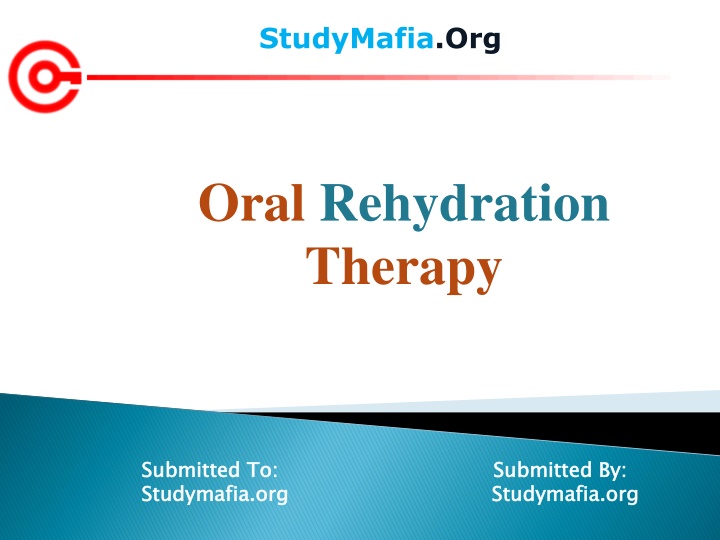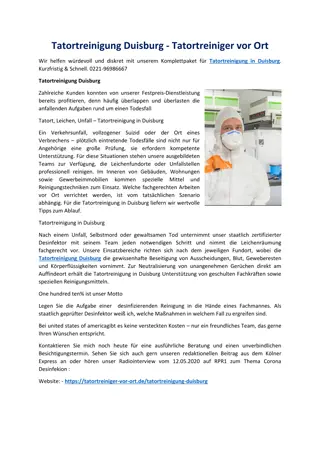
Oral Rehydration Therapy for Dehydration Treatment
Oral rehydration therapy (ORT) is an effective treatment for dehydration caused by conditions like gastroenteritis. Learn about the benefits, preparation, and importance of ORT in this comprehensive guide.
Download Presentation

Please find below an Image/Link to download the presentation.
The content on the website is provided AS IS for your information and personal use only. It may not be sold, licensed, or shared on other websites without obtaining consent from the author. If you encounter any issues during the download, it is possible that the publisher has removed the file from their server.
You are allowed to download the files provided on this website for personal or commercial use, subject to the condition that they are used lawfully. All files are the property of their respective owners.
The content on the website is provided AS IS for your information and personal use only. It may not be sold, licensed, or shared on other websites without obtaining consent from the author.
E N D
Presentation Transcript
StudyMafia.Org Oral Rehydration Therapy Submitted Studymafia.org Studymafia.org Submitted To: To: Submitted Submitted By: By: Studymafia.org Studymafia.org
Table Contents Definition Introduction Benefits of Oral Rehydration Therapy Need of Oral Rehydration Therapy Preparation of Oral Rehydration Therapy Treatment of Oral Rehydration Therapy After Treatment of Oral Rehydration Therapy Conclusion 2
Definition Oral rehydration therapy (ORT) is an effective form of treatment for dehydration caused by gastroenteritis. 3
Introduction ORT is an effective alternative to intravenous therapy and can be given in a range of settings. Oral rehydration solution (ORS) can be bought in stores in a pre-mixed bottle or packaged powder. ORS should be given in small, frequent amounts. If your child's dehydration or sickness does not improve with ORT, take them to the hospital for assessment. 4
Benefits of Oral Rehydration Therapy If your child becomes severely dehydrated, they may need to have their fluids replaced through an intravenous line (IV). However, oral rehydration therapy is as effective as, if not better than, intravenous fluid therapy for rehydrating mild or moderately dehydrated children. 6
Benefits of Oral Rehydration Therapy There are a number of benefits for this: ORT is less traumatic for a child, as they will not need needle "pokes" for the IV or blood work. ORT is easier to give in a range of settings, including at home 7
Need of Oral Rehydration Therapy Most cases of dehydration are very minor and do not require any medical attention. They can usually be treated by drinking fluids such as water, breast milk, baby formula or diluted juices. Oral rehydration therapy is used for treating the more serious dehydration that is caused by viral gastroenteritis, also known as stomach flu. 8
Need of Oral Rehydration Therapy This virus can cause a child to vomit repeatedly or have prolonged diarrhea, which can result in dehydration. In the United States and Canada, the dehydration that results from gastroenteritis results in about 220,000 hospital admissions a year. Most hospitalizations occur when dehydration is not treated early. 9
Preparation of Oral Rehydration Therapy An oral rehydration solution (ORS) is a specially-created solution that contains a mixture of: water glucose sodium, potassium and other electrolytes. 10
Preparation of Oral Rehydration Therapy Together, these ingredients help replace lost fluids and nutrients that the body needs to work properly. The solution normally takes about five minutes to start passing from the digestive system into the blood stream 11
Preparation of Oral Rehydration Therapy Oral rehydration solution is sold at most pharmacies in: pre-mixed bottles packaged powders that need to be mixed with water. Examples of commercial brands of ORSs include Pedialyte, Infalyte and Resol. 12
Preparation of Oral Rehydration Therapy Pre-mixed liquid ORSs have the correct balance of fluids, salts and glucose. ORS powders are cheaper and have a longer shelf life. However, if a powder is not mixed with the amount of water specified, the resulting solution can either be too concentrated or too diluted, making it less effective. 13
Treatment of Oral Rehydration Therapy Give your child oral rehydration solution in small, frequent amounts. Use a spoon or dropper to make sure the first doses are very small. Small amounts will allow your child to better retain the ORS and reduce the chance of vomiting. Gradually increase the amount of ORS until your child is able to drink the full dose recommended for them. 14
Treatment of Oral Rehydration Therapy If your child refuses to drink the ORS, squirting the solution into their mouth with a syringe can be helpful. In very rare cases, where a child refuses to drink the ORS by any of these measures, a nasogastric feeding tube can be used in hospital. 15
After Treatment of Oral Rehydration Therapy As soon as your child has been rehydrated, you can start giving their regular diet. This involves re-introducing age-appropriate foods, which promotes better nutrition and reduces the duration of diarrhea. If a breast-fed infant is dehydrated, continue breastfeeding throughout the illness. In non-breastfed infants, offer undiluted formula. 16
Conclusion Give oral rehydration solution (ORS) immediately to dehydrated patients who can sit up and drink. If ORS is not available, you should provide water, broth, and/or other fluids. You should not provide drinks with a high sugar content, such as juice, soft drinks, or sports drinks, because they could worsen diarrhea. 18




